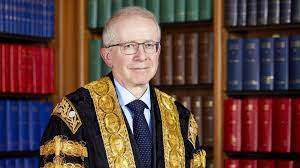The recent assurance by Lord Robert John Reed, president of the Judicial Committee of the Privy Council (JCPC), that the UK-based court is pleased to serve Jamaica, has been welcomed news for local Christian attorneys.
In a letter to the Jamaica Gleaner last week, Lord Reed said he and the other judges .0 sit on the JCPC consider it an honour to serve the people of Jamaica as the country’s highest court.
“This is a major responsibility and one that the court takes very seriously. The decision on whether to retain the JCPC is entirely one for the Jamaican government and people. We will continue to consider it a privilege to serve as the final court of appeal, unless and until Jamaica decides otherwise,” he wrote.
Public debate as to whether Jamaica should retain the Privy Council as its final appellate court or switch to the Caribbean Court of Justice (CCJ) has intensified since the government announced a Constitutional Reform Committee (CRC) in March to ensure Jamaica’s smooth transition to a republic. Among those who want Jamaica to continue using the Privy Council is attorney Shirley Richards. Richards, who is the former head of advocacy group Lawyers’ Christian Fellowship, wants the CRC to take Lord Reed’s recent commentary into consideration during the ongoing deliberations.
“I was sort of relieved to see that coming from the Privy Council itself,” Richards told the Freedom Rain Newspaper, in reference to the letter from the senior judge.
Richards had stated in the past that while politically there would seem to be a strong argument for Jamaica to replace the Privy Council with the CCJ, there is concern that the CCJ has taken unto itself an activist role and will be used to facilitate cultural imperialism. The president of the CCJ has publicly stated that the court is an “executing agency” for donor funds. Some have pointed to the fact that several of these donors are also financing the LGBTQ push in the region.
A few of Lord Reed’s colleagues had hinted in the past that cases outside of the UK were placing a burden on Britain’s Supreme Court, but Richards believes attention should be given to what the current president is saying.
“People have had their opinions over the years, and the outlook will change from time to time, depending on who comprises the court,” she said.
Attorney-at-law Jamila Thomas is also aware of the concerns that were previously raised by judges at the Privy Council, but she too would not like the country to adopt the CCJ as the country’s final appellate court.
”If the president is now saying that they have no problem, I don’t know why there would be any reason to doubt what he has said; we have to take it at face value,” she said.
Lord Reed also discounted the widely held belief that accessing the Privy Council is expensive. He noted that hearings can be accessed online, so that lawyers can interact with the judges from their offices in Jamaica.
“So there is no reason for the costs involved in travelling to the UK to be a barrier to justice. Further, the hearings that we hold in London are all streamed live on the internet and can also be watched on catch-up,” he said.


